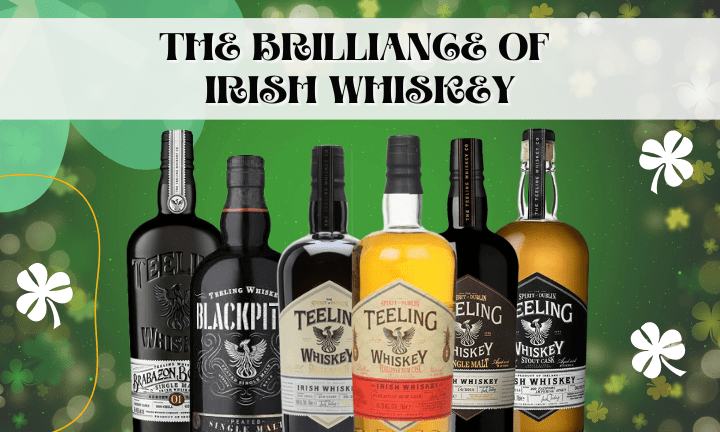Irish whiskey is enjoying an explosive period of growth and global interest. In 2010, there were just four distilleries in Ireland; today they are 40 distilleries, with more being built. Although Scotch is still the world’s top choice for whisky, few can deny Irish whiskey’s current moment in the spotlight.
But what is it about Irish whiskey that makes it so unique, and different from Scotch? We take a look at some of the key factors that makes Irish whiskey so distinct (and we’re not just talking about adding the ‘e’ in spelling whiskey).
Triple Distillation
Despite its long association with triple-distillation, Irish whiskey has no legal requirement to be triple distilled to be called “Irish whiskey”. Having said that, most Irish whiskeys are, resulting in a lighter flavour compared to Scotch malt whiskies that are mostly double-distilled. The result is a whiskey that tends to be soft, mellow, and showcases a stronger cask influence.
The Teeling Single Malt is a classic example of what triple distillation can do; made with 100% malted barley, the spirit was matured and finished in five wine casks – sherry, port, madeira, white burgundy, cabernet sauvignon – to deliver a unique fruit-forward flavour profile that is complex, yet balanced.
The process can lead to other interesting expressions, seen especially in the likes of Teeling Blackpitts, where the spirit from peated malt is triple distilled, reducing the harsh medicinal aromas and allowing the more barbecue smoke flavours to shine.
Buy Teeling Single Malt here >>
Buy Teeling Blackpitts here >>
Unmalted Barley: The Secret Ingredient
Compared to Scotch’s two styles (malt and grain whisky), Irish whiskey has three: malt, grain, and single pot still – the last of which is uniquely Irish. Compared to single malt, which is made from 100% malted barley, a single pot still whiskey must be made from at least 30% malted and 30% unmalted barley and up to 5% other grains which is then triple distilled in copper pot stills within a single distillery.
Furthermore, each Irish distiller has a different mash recipe in creating their own house-style, such as Teeling’s Single Pot Still that uses a recipe of 50% malted barley and 50% unmalted barley. The result is a whiskey that’s distinctively barley-forward, with plenty of grain cereal and biscuit notes that isn’t as present in a Scotch.
Buy Teeling Single Pot Still Whiskey here >>
Irish Distillers Love To Experiment
While oak is the only permitted type of wood casks used in making Scotch, Irish whiskey has no such limitations on the type of wood, which has encouraged Irish distillers to go beyond where few Scotch distillers dare. You’ve probably heard about Midleton Distillery’s Method And Madness series, while Teeling has its Wonders of Wood series that plays around with different casks like cherry wood.
That spirit of adventure goes on in their exploration of partnerships and surprising expressions. This includes Teeling’s Pineapple Rum Cask whiskey, which was made in collaboration with rum producer Plantation; Teeling’s Stout Cask Whiskey, which saw them partner up with Galway Bay Brewery; and Teeling’s upcoming Blackpitts “Big Smoke” Cask Strength, a peated whiskey that’s curiously double-distilled to create a heftier spirit.
And given the boom in Irish whiskeys, you can expect a lot more interesting expressions coming our way in the coming months.


